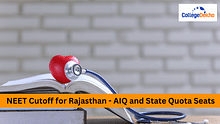Studying abroad can be an expensive affair, making an education loan one of the options to afford it. Here is everything you need to keep in mind while applying for an education loan in order to fulfil your study abroad dream.

Looking forward to studying further or going abroad to pursue your higher education?
Be it government sector banks or private sector banks, nowadays, loans are granted by every renowned bank to students for a better and secured education. A loan is an amount of money you require which is granted to you and after a particular period of time, you need to pay back the entire amount with the interest added on to it.
With the cost of quality education skyrocketing, especially in a foreign country, students and guardians often resort to applying for education loans. Also, it is especially during unchallenging times like these that an education loan comes to rescue.
While an education loan can help ease your financial burden, it may end up becoming rather a big burden if not managed well. These little things mentioned below would help you when applying for an educational loan at a bank.
Eligibility for an Education Loan for Foreign Studies
Here are the requirements you need to satisfy in other to be considered for an education loan:
Must be a resident of India.
Must be aged between 16 and 35 years.
Must have secured admission to a programme at a foreign university approved by the bank or are part of the list of approved institutions for an education loan.
Must have an excellent academic background.
Expenses Included in Education Loan
An education may cover the following academic or non-academic expenses while studying in top study destinations such as the US, the UK, New Zealand, Canada, Germany, Australia, Switzerland, among others.
Academic Expenses:
Tuition Fee
Registration Fee
Capitation Fee
Examination Fee
Counselling Fee
Laboratory Fee
Hostel Fee
Library Fee
Transportation Fee
Food (Mess) Fee
Study Visits and Education Tour Fee
Non - Academic Expenses:
Student Insurance
Laptop
Transport and Commuting Expenses
Refundable Caution Money
A two-wheeler
Equipment Required for Course
Project Expenses
Student Welfare Contribution
Entrance Exam Fee (GMAT, TOEFL, GRE, SAT, LSAT, MCAT or any other)
In-Flight Expenses
Also Read: MBA in India vs MBA Abroad: Which is More Valuable?
Things to Keep In Mind While Applying For Education Loan
Before you head out to apply for an education loan, look at these things that you need to keep in mind to make an informed decision:
Choose the Institute Carefully
Banks approve institutions on the basis of a number of factors including job placement, rating, infrastructure, reputation, standing, among other things. Most banks usually have a pre-approved list of universities based on which an education loan may be sanctioned. Similarly, they also have a list of blacklisted universities. It is advisable that you have an idea of the same before applying to foreign universities. However, if your institute does not fall under the list of pre-approved universities, you may go to a different bank.
Interest and Processing Fee
The interest rate for an education loan in India is somewhere between 8.50% and 15.20%. Some banks tend to reduce the interest rate if you pay the loan interests on time and few may even offer a concession to women applicants.
You should be aware of the processing fee charged by the bank from where you be taking an education loan. It may, nevertheless, be fixed at 1% to 2% of the entire loan amount.
Be Thorough About the Process
Before filing in for the application, students must be thorough about the entire process of taking and repaying the loan from banks or other institutes. Students must be aware of the course fees, documents, scholarship grants, interest to be paid or any other important areas of loans.
Get Ready for the Loan Interview
Loan applicants must be prepared for the final interview that is taken by the bank or the institute. They verify your documents and other identities with fee structure and basic allowance to pay back the loan on time.
Also Read: Opportunities to Study Abroad after Class 12th: Courses, Eligibility and Scope
Keep All the Documents Ready
Students must be up to date with their basic documents. Students going to abroad for further studies must keep their passport, visa and other ID proofs with themselves ready for any kind of verification. Here is the list of the required documents for an education loan.
Filled application form
Passport size photographs of the applicant
Photo ID of the applicant
Residence proof of the applicant
Mark sheets and certificates of the applicant
Score reports of GRE, GMAT, SAT, ACT, TOEFL/IELTS, or any other applicable
Letter of Acceptance from the university
The co-applicant's last six months bank statements
Income proof of the co-applicant
In the case of immovable property, the required documents will be:
Building approved plan
Property title deed
NOC for a mortgage from builder or society
Learn All About the Important Details
Students should keep in mind the minute detail about the loan and its application. Things like it take 15 days for an educational loan to get sanctioned. Post that, you need to sign on a promissory note. Interest rates on an educational loan vary from 10% to 15% rates of interest.
Bank Details
One must be aware of the bank details from which the loan has to be granted. Every bank has its own policies. In most cases, banks either pay the loan directly to the institution or to you. Depending on the amount you require, there are various documents that need to be produced like income statement, statement of assets and liabilities, etc.
Cost over EMI
If circumstances permit or if you are certain that you will get a stable job after completion of the course, then you should apply for a shorter loan period as higher loan periods result in higher interest. So eventually, a shorter loan tenure would mean a higher EMI but cheaper loan altogether.
Moratorium Periods
Moratorium periods are the holiday periods during the course plus one year after completion of the course or six months after landing a job. While banks may allow you to not pay the loan during this period (interest will keep accumulating), you may pay the EMIs to lessen the financial burden in the future.
With these basic things to keep in mind, your loan becomes an easy step towards pursuing your higher education abroad!
Still confused about applying for an education loan? Write to us at abroad@collegedekho.com or call us at 785 9990 990 and let us know about all your doubts.

















Similar Articles
Top Institutes with 100% Job Placements in 2023-24: Highest Package, Key Recruiters
List of Colleges in Delhi University: Affiliated/ Recognised Colleges in DU
Best Career Options After Qualifying UGC NET 2024
What is a Good Score in UGC NET 2024?
UPSC CSE 2025: Calendar (Out), Posts, Strategy, Registration & More
How to Check KVS Admission List 2024-25 (1st, 2nd, 3rd): Direct Link, Latest Updates, Steps for Class 1 & Above